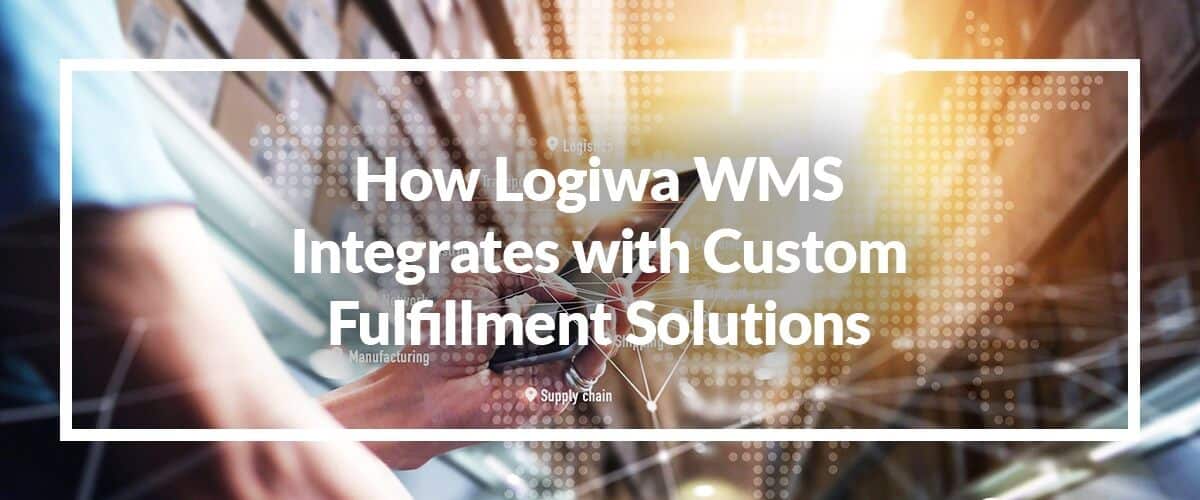In this blog, we will discuss how to achieve a competitive fulfillment approach, including: the benefits of combining custom-built and pre-built solutions, why Logiwa WMS works well with custom solutions and how the Logiwa platform uses leading integration tools to connect to them.
Key Takeaways
- By combining proprietary and custom fulfillment solutions businesses achieve an even greater competitive advantage.
- Custom-built solutions provide tailored alignment to unique processes, while pre-built solutions promise quick implementation, reliability and predictability in costs.
- Certain solutions, such as warehouse management systems (WMS), are best left to experts due to their intricacy, while others can benefit from a tailored approach.
- Logiwa’s highly configurable fulfillment platform ensures high-efficiency operations and long-term scalability, while still allowing for customization where it matters.
- Logiwa WMS makes it easy to integrate with custom solutions with its open Rest API and EDI capabilities, Integration Orchestrator platform and powerful webhooks.
Contents
Building the Ultimate Fulfillment Strategy
The question of whether to build or buy a warehouse management system prompts an even larger debate: Are custom-built or proprietary solutions better? Are there certain systems that are better to build in-house than others? Is there a way to embrace both types?
Creating custom technologies is valuable for ensuring tailored functionality, but so is ensuring long-term scalability and cost-efficiency with a pre-built solution. The good news is that leveraging both types can help your business achieve an even greater outcome, that is to say building a competitive, future-proof fulfillment strategy. For more insights into building out a fulfillment solutions stack, and the different systems to consider, read the first blog in this series, “Fulfillment Solutions to Transform Your Operations.”
Benefits of Combining Pre-Built and Custom Fulfillment Solutions
Syndication between custom and pre-built solutions ensures core functionalities are maintained for unique processes without sacrificing the competitive advantages of working with established vendors and industry-leading systems.
In other words, it is possible to have the best of both worlds:
Benefits of Custom-Built Solutions
- Tailored solutions ensure that systems align perfectly with your unique business processes, established tech stack and existing infrastructure.
- Integrations and modifications can be made without delay, and include exclusive customizations that set you apart from competitors.
- Having full control and ownership over solutions allows you to add, remove or change features without relying on external vendors or risking potential licensing issues, restrictions or fees.
- Monthly service charges associated with software as a service (SaaS) models are avoided.
Benefits of Pre-Built Solutions
- Out-of-the-box solutions come with pre-built features and functionalities that are ready to be used upon implementation, reducing deployment time and promoting a quick ROI.
- Vendors ensure high levels of dependability with support services and regular updates, resolving technical issues, troubleshooting, maintaining security and staying ahead of cutting edge features on your behalf.
- Downtime is minimized and performance enhanced, especially during high traffic periods, because proprietary solutions are thoroughly tested and optimized using vendor expertise for stability and reliability.
- Costs are predictable, such as licensing and subscription fees, aiding cost-efficiency and financial planning.
When it comes to choosing which solutions to build yourself and which ones to rely on a vendor for, most operations will agree that warehouse management systems (WMS) are best left to the experts.
Developing a WMS involves a significant commitment of time and resources, as well as a mastery over integrations, automation, artificial intelligence (AI) and market trends, making it a significant risk and challenge to get right. Other systems, like order management systems (OMS), merchant platforms or customer relationship management (CRM) solutions – which are simpler in design and distinct for each individual business – can benefit greatly from a custom approach.
For more insights on the pros and cons of self-built and proprietary systems, read the second blog in this series, “Build vs Buy WMS Software: Making the Right Choice for Your Fulfillment Operation.”

Combining Logiwa WMS with Custom Fulfillment Solutions
Logiwa WMS was built to integrate easily with other solutions, whether they are custom-built or proprietary solutions. Our highly configurable fulfillment platform ensures high-efficiency operations and long-term scalability, while still allowing for customization where it matters most in your solutions stack.
When it comes to combining Logiwa WMS and custom solutions, Logiwa ensures:
- Cost-savings by eliminating the significant investments around WMS development and implementation, ongoing IT support and infrastructure maintenance, cloud-security and compliance, and efficiency-boosting functionalities;
- Fast, effective integrations using Logiwa’s wide range of integration tools, including our pre-built integrations to popular systems, Open Rest API, EDI capabilities, webhooks, and Integration Orchestrator connectivity platform for establishing any custom connection;
- Cutting edge feature enhancements stemming from Logiwa’s research and development experts, who incorporate knowledge from hundreds of clients and industry connections (which then benefit all our clients);
- Access to free professional services and technical support with Logiwa’s experienced solutions engineers, who figure out how best to connect your custom tech stack with our WMS and enhance your processes to drive optimal workflow results;
- Competitive market adaptability using AI, smart automation and built-in data analytics, which help you streamline operations, leverage the data from your custom solutions and stay ahead of changing industry and consumer trends (e.g. fluctuations in shipping rates, carrier-availability, consumer behavior, etc.);
- 24/7 communication channels and dedicated resources for ensuring any issues that arise are resolved with expediency.
Logiwa users have the peace of mind needed around mission-critical solutions like your WMS combined without giving up the comfort of custom-built solutions.
How Logiwa Integrates with Custom-Built Technologies
Logiwa’s robust integration capabilities provides a great breadth of options for system communication and data transfer at record speed, delivering optimal time to value, ease and customization.
Logiwa maintains strong integration partnerships and pre-built connections to key solutions, eliminating the need to build out custom integrations for widely used industry applications. That said, our all-in-one fulfillment solution can incorporate custom-built technologies as well.
Whether you need proprietary or custom solutions to conduct your business – like vendor and ecommerce platforms, order management systems (OMS), customer relationship management (CRM) solutions, shipping carriers or ERP and accounting solutions – Logiwa makes it easy to connect.
Logiwa’s robust integration toolbox includes:
Open Rest API
Logiwa’s open Rest API enables you to pass information, such as receipts and product information, back and forth between your stores/marketplaces, warehouses, custom websites and existing solutions and Logiwa WMS. That includes product master data, purchase order data, shipment order data, reports and more.
Our open API offers absolute flexibility with its ability to connect with whatever tech stack you are currently using, no matter how advanced or customized. With infinite connection options, and no limit to the number of calls you can make between endpoints, Logiwa guarantees smooth data exchanges. Plus, the size of the order in the API call does not matter with the Logiwa system.
EDI
Logiwa supports a number of EDI connection types, file types, and transaction sets, to provide users with even more integration options. This includes EDIs 810, 846, 850, 855, 856, 940, 945, 997 – which cover transaction notices, advanced shipping notices (ASN) with shipment descriptions, process execution orders, confirmations or acknowledgements, invoice requests, inventory inquiries, purchase order details and more.
Our system integrates seamlessly with TrueCommerce and SPS Commerce and supports EDI file transfers related to shipping (e.g. UCC-128) as well. Most importantly, Logiwa’s EDI capabilities allow for the ability to create new EDI formats for a custom approach.
Webhooks
Logiwa’s webhooks allow two systems, such as our WMS and your OMS, to talk to each other and share data, similar to an API. With webhooks, your systems can send notifications to each other to expedite and inform a variety of processes when a “trigger event” is registered by the appropriate system.
Logiwa’s webhooks allow you to subscribe to event-driven notifications about changes in your integrated WMS data, such as changes in order status. Webhooks are triggered in real-time, so the notifications you receive are timely and can be used to update your other business systems based on what’s happening throughout your fulfillment operations.
Integration Orchestrator
Logiwa’s new connectivity platform, Integration Orchestrator, supports the establishment of new integrations with other applications in a flexible and timely manner. This expedites API connections and allows you to quickly handle any data changes that may arise throughout your operations, with many of today’s popular EDI file types already mapped out.
Integration Orchestrator allows Logiwa WMS to connect directly to your FTP or AS2 server to pick up EDI files. It supports additional connection types to pull EDI files such as Dropbox or AzureBlob, as well as EDIFACT, HL7, XML and more.
Logiwa WMS for Fulfillment Strategy
A competitive fulfillment strategy often necessitates a strategic combination of custom-built and proprietary solutions. Logiwa makes it easy to achieve this harmonious union using a variety of integration functionalities, including robust API and EDI capabilities, its Integration Orchestrator platform and efficiency-boosting webhooks.
Logiwa’s cloud fulfillment platform is a pivotal solution for seamlessly joining a variety of systems. Learn more by reaching out to our technology experts and scheduling a demo of our award-winning WMS today.
FAQs Related to Custom Fulfillment Solutions
What are custom fulfillment solutions, and how do they differ from pre-built solutions?
Custom fulfillment solutions refer to tailor-made technologies designed to align perfectly with unique business processes and existing infrastructure. Unlike pre-built solutions, custom solutions offer exclusive modifications, providing businesses with full control and ownership over features without relying on external vendors.
Can a fulfillment strategy benefit from using custom-built and pre-built fulfillment solutions simultaneously?
Yes, integrating custom-built and pre-built solutions can yield exceptional benefits. Custom solutions provide personalized functionalities, ensuring a perfect fit for intricate business needs. Simultaneously, pre-built solutions offer ready-to-use features, reducing deployment time, boosting cost-efficiency and ensuring reliability. Combining both approaches allows businesses to maintain core functionalities through custom solutions while leveraging the convenience and dependability of pre-built solutions, resulting in a powerful and adaptable fulfillment strategy.
Why is it essential to choose the right technology partner when implementing custom fulfillment solutions?
Selecting the right technology partner is crucial for ensuring seamless integrations between custom-built technologies and your warehouse management system (WMS). With the expertise of a trusted partner, businesses can leverage cutting-edge technology and navigate the complexities of joining multiple systems to optimize high-volume operations. A dependable partner provides the necessary support and expertise, enabling businesses to optimize their processes and stay ahead in the competitive landscape.
Scale up B2C fulfillment operations with an integrated digital warehouse and fulfillment system
Warehouse Management
Modern digital WMS powers a modern fulfillment experience






